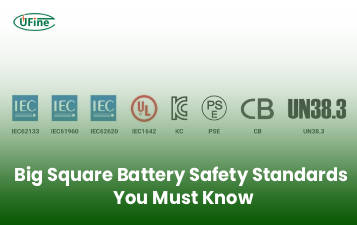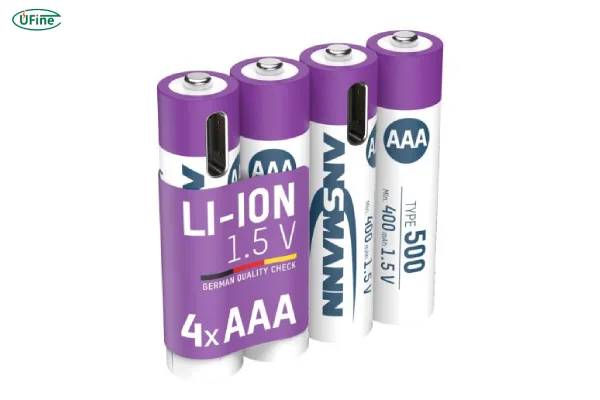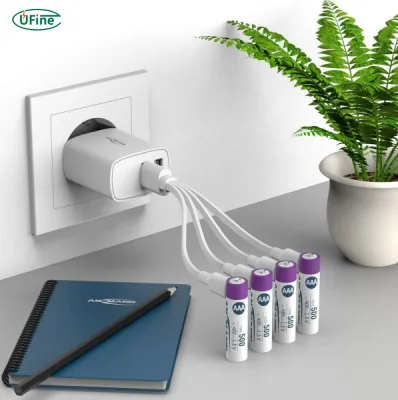
- Part 1. What is a li-ion AAA battery?
- Part 2. The parameters that define a li-ion AAA battery
- Part 3. How do li-ion AAA batteries compare with other AAA types?
- Part 4. Are all li-ion AAA batteries rechargeable?
- Part 5. Rechargeable vs. non-rechargeable: spotting the differences
- Part 6. Applications: where each type fits best
- Part 7. How to identify rechargeable li-ion AAA batteries
- Part 8. Why Ufine Battery should be your go-to partner
- Final 9. Final words
- Part 8. FAQs
In this guide, we’re going to walk you through what Li-ion AAA batteries are, why they matter, how to tell if they’re rechargeable, and what to do if you’re unsure. We’ll go beyond the surface to help you make safer, smarter decisions for your devices, your wallet, and even your safety.
Part 1. What is a li-ion AAA battery?
Let’s start simple. A Li-ion AAA battery is a lithium-ion battery built to the size standard of AAA batteries: 10.5mm in diameter and 44.5mm in length. That’s the same size as the alkaline or NiMH batteries you’ve probably used all your life.
But chemically and electrically, lithium-ion is a totally different beast.
Compared to traditional AAA batteries:
- Li-ion batteries usually have a voltage of 3.6V or 3.7V
- Alkaline batteries offer just 1.5V
- NiMH batteries typically deliver 1.2V
This higher voltage means li-ion batteries can pack more punch in a smaller space, making them great for high-drain devices like cameras, RC toys, and medical tools.
Why Lithium Batteries Use 3.7V?
But here’s where it gets tricky: not all Li-ion AAA batteries are rechargeable. Some are primary lithium (non-rechargeable), while others are secondary lithium-ion (rechargeable). They often look almost identical. And if you try to recharge the wrong one? You could end up with a leaking battery—or even a fire.
Part 2. The parameters that define a li-ion AAA battery
If you want to really understand lithium-ion AAA batteries, you need to look under the hood—or rather, the label. Here are the key technical specs that matter:
| Parameter | Typical Value for Li-ion AAA |
|---|---|
| Nominal Voltage | 3.6V or 3.7V |
| Capacity | 300mAh–1200mAh |
| Rechargeable | Sometimes (not always) |
| Chemistry | Lithium-ion or lithium metal |
| Shelf Life | 5–10 years |
| Charging Cycles | 300–1000+ (if rechargeable) |
| Self-discharge Rate | Very low |
| Weight | Light |
| Safety Circuit | Often included (for rechargeable types) |
The voltage of a Li-ion AAA is typically more than double that of a standard AAA battery. That extra power comes with more responsibility.
Part 3. How do li-ion AAA batteries compare with other AAA types?
Many people ask: “Why not just stick to the old-school alkaline or NiMH batteries?”
Let’s look at how Li-ion AAA batteries stack up:
| Type | Rechargeable | Voltage | Cycle Life | Cost | Best Use Case |
|---|---|---|---|---|---|
| Alkaline | No | 1.5V | Single use | Low | TV remotes, clocks |
| NiMH | Yes | 1.2V | 500–1000 | Medium | Flashlights, toys |
| NiCd | Yes | 1.2V | 500+ | Low | Industrial tools (less common now) |
| Li-ion AAA | Sometimes | 3.6–3.7V | 300–1000+ | Higher | High-drain electronics |
As you can see, Li-ion AAA batteries are powerful, but that power must be managed wisely. The key risk is mismatching voltage—using a 3.7V battery in a device meant for 1.5V can fry the internal circuits.
Part 4. Are all li-ion AAA batteries rechargeable?
This is where many people go wrong.
Just because a battery says “Li-ion” or “Lithium” doesn’t mean it’s rechargeable.
In fact, some lithium AAA batteries are made for one-time use only. These are often referred to as primary lithium batteries. They typically use lithium metal instead of lithium-ion chemistry. They’re not designed to handle the heat and pressure of recharging.
So why are they dangerous to recharge?
- Heat buildup
- Internal gas generation
- No built-in protection circuit
- Chemical instability when recharged
AAA Rechargeable Batteries: Your Essential Guide
Even a slight overcharge could lead to leakage, rupture, or even an explosion. It’s not a scare tactic. It’s science.
Part 5. Rechargeable vs. non-rechargeable: spotting the differences
Here’s a quick checklist to help you tell whether your Li-ion AAA battery is rechargeable:
| Feature | Rechargeable Li-Ion AAA | Non-Rechargeable Lithium AAA |
|---|---|---|
| Label says “Rechargeable” | Yes | No |
| Voltage | 3.6–3.7V | 1.5V or 3.0V |
| USB Charging Port | Often included | Never |
| Weight | Slightly heavier | Lighter |
| Price | Higher upfront cost | Cheaper per battery |
| Protection Circuit Inside | Usually | Rare |
Pro Tip: If it includes a micro-USB or USB-C port, it’s almost certainly rechargeable.
Part 6. Applications: where each type fits best
You wouldn’t wear running shoes to a wedding. Likewise, choosing the wrong battery for your device could damage it or cut its lifespan in half.
Use Rechargeable Li-Ion AAA Batteries For:
- Wireless keyboards and mice
- Flashlights and headlamps
- RC cars and drones
- Bluetooth speakers
- Medical meters
- Professional tools
Use Non-Rechargeable Lithium AAA Batteries For:
- Smoke alarms
- Digital thermometers
- Remote controls
- Outdoor sensors
- Emergency beacons
- Backup systems
Part 7. How to identify rechargeable li-ion AAA batteries
When in doubt, don’t guess. Here’s how to be sure:
- Read the Label – Look for “Rechargeable,” “Li-ion 3.7V,” or “ICR” (lithium-ion designation).
- Check for Ports – A USB port for direct charging? That’s a giveaway.
- Search the Brand’s Website – Look for technical datasheets or model info.
- Look for Built-in Protection – Rechargeable Li-ion batteries often mention overcharge protection.
Part 8. Why Ufine Battery should be your go-to partner
When it comes to lithium-ion batteries, quality matters more than anything. That’s why working with a trusted, professional manufacturer is vital.
Ufine Battery is a Chinese custom lithium battery manufacturer with a strong reputation in the global market. We provide:
- Lithium polymer batteries
- LiFePO4 batteries
- 18650 cylindrical cells
- Ultra-thin, high-rate, and high-temperature batteries
- Fully customizable voltage, capacity, and size to meet your exact needs
Whether you need reliable li-ion AAA batteries for consumer gadgets or scalable solutions for industrial-grade applications, Ufine Battery has the expertise, certifications, and technology to make it happen.
Final 9. Final words
It’s easy to think of batteries as simple. Pop one in, and your device works. But as battery tech becomes more powerful and complex, the risks grow too.
By learning how to distinguish between rechargeable and non-rechargeable Li-ion AAA batteries, you not only protect your devices—you protect yourself.
When in doubt, read the label. Understand the voltage. Choose the right power for the right purpose.
And when quality and customization matter, always choose a name you can trust—like Ufine Battery.
Part 8. FAQs
Can I charge a lithium AAA battery that doesn’t say it’s rechargeable?
No. That’s extremely dangerous and could cause the battery to explode.
How long do rechargeable Li-ion AAA batteries last?
On average, 300–1000 charge cycles, depending on brand and usage.
Can I use a 3.7V Li-ion battery in place of a 1.5V alkaline battery?
Only if the device is rated for higher voltage. Otherwise, you risk permanent damage.
Why are Li-ion AAA batteries more expensive?
They offer higher power, longer life, and advanced protection circuits.
What’s the safest way to dispose of Li-ion AAA batteries?
Never throw them in the trash. Use a certified battery recycling program.
Related Tags:
More Articles

Big Square Battery Safety Standards You Must Know
Learn key safety standards for big square batteries to avoid fire risks, shipping delays, and compliance issues in EV, industrial, and energy storage projects.
Big Square Battery Applications in Solar & Industrial Equipment
Big square batteries deliver high capacity, stable output, and long life for solar, industrial, and backup power. Explore key uses and advantages.
Big Square Battery vs Cylindrical Battery: Complete 2025 Guide for EVs, ESS & Industrial Devices
Choosing the right battery is key for designers and engineers. Compare big square vs cylindrical batteries to find the best fit for your application.
How to Choose the Right Big Square Battery for Your Device?
If you’re choosing a big square battery for EVs, solar, or mobility devices, this guide helps you pick the right solution for real-world needs.
Big Square Battery Complete Guide: Types, Uses & Buying Tips
If you are choosing a big square lithium battery for EVs, solar, RVs, or AGVs, this guide helps you select the right NMC, LFP, or LTO solution with examples.




